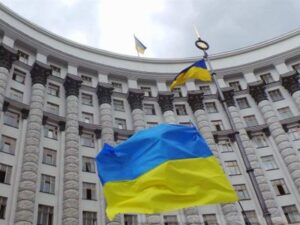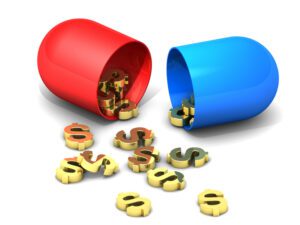
The Cabinet of Ministers of Ukraine has banned all types of advertising of gambling business, follows from the government decree № 583.
Thus, amendments were made to paragraph 1 of the Cabinet of Ministers Resolution No. 566 of May 17, 2024 “Some issues of counteraction to the negative consequences of the functioning of gambling on the Internet”.
“Subparagraph one after the words ‘order of restriction’ is supplemented with the words ‘of all forms’, and after the words ‘by restriction’ – with the words ‘namely a ban’, – stated in the resolution.
According to the document, the ban will be in force until the entry into force of the law on combating game addiction, which is now under consideration by the Verkhovna Rada.
ADVERTISING, CABINET OF MINISTERS OF UKRAINE, GAMBLING BUSINESS

Doctors and pharmaceutical manufacturers demand to strengthen the fight against illegitimate advertising of fake medicines on the Internet using well-known brands and faces of leading experts in the medical industry.
As Doctor of Medical Sciences, Director of the Heart Institute of the Ministry of Health Borys Todurov emphasized at a press conference at Interfax-Ukraine on Tuesday, fraudulent advertising on the Ukrainian pharmaceutical market can claim hundreds and thousands of lives. As an example of this, he cited the fact that, in particular, fake drugs are often advertised on the Internet in his name.
“On the Internet, on Facebook, drugs are offered in my name that we allegedly develop. Don’t believe that this is so – we do not take part in the development of new drugs. We perform operations, we only engage in surgery,” he said.
Todurov noted that every day he responds to many messages regarding fake drugs that he is allegedly developing, and there are “dozens” of such drugs. One of the latest such fake drugs that is sold online in his name is Normocardis.
Todurov noted that he had already contacted law enforcement agencies with statements about precedents, and that the cyber police had already opened a criminal case into the use of his name and the names of his colleagues.
“It is very difficult to track such scammers, they are often located abroad. But I think that it is possible to find and catch at least those people who distribute fake drugs in Ukraine – they have telephone numbers, a specific address, they can be tracked,” the director of the Heart Institute said.
Todurov noted that advertisements for fake drugs are often created using artificial intelligence (AI) technologies, which make it possible to create believable videos using the images and voices of specific famous doctors.
In turn, Honored Doctor of Ukraine, director and founder of the medical center Clinic of Dr. Valikhnovsky Rostyslav Valikhnovsky said that on his behalf there were recorded cases of distribution of at least eight drugs and dietary supplements that supposedly treat joints, varicose veins, heart, and rheumatic diseases.
“This has absolutely nothing to do with reality. I want to put it on record that this is not true and our brand has nothing to do with these drugs,” he said.
Valikhnovsky noted that the clinic also contacted the cyber police in Kyiv, and law enforcement agencies managed to block sites that posted such information in one day. However, he noted that it was not possible to solve this problem with Facebook.
“With Facebook it is very difficult to solve this problem during the war, so with this press conference I would like to appeal to the Minister of the Interior, the Prosecutor General, so that they take this problem under personal control,” he said.
Valikhnovsky noted that “if nothing is done now at the beginning of the development of AI, then later we will not be able to correct anything.”
At the same time, he emphasized that clinics and doctors without law enforcement agencies cannot independently identify fraudsters and fight them.
For his part, head of the Association of Pharmaceutical Manufacturers of Ukraine Petro Bahriy clarified that in war conditions it is quite difficult to estimate the volume of the market for such fake drugs, including due to the ban on inspections.
“We cannot accurately estimate the volume of such a market, especially during the war. But we are interested in the Ukrainian pharmaceutical market being transparent, so that the promotion of medicines is legal, because we know about the responsibility for people’s health,” he said.

Bahriy noted that the Association was one of the initiators of introducing criminal liability for false advertising and the production and distribution of fake drugs.
“I support my colleagues and appeal to law enforcement agencies and everyone who can help overcome this shameful phenomenon and stop these scammers who today, using well-known brands of doctors, promote in their name fake drugs that harm health and even kill,” he said.
Bahriy also emphasized that leading domestic pharmaceutical companies are constantly developing R&D, developing new drugs according to international standards of evidence-based effectiveness, safety and quality, investing significant funds in this area.
“Fake drugs sold online in this way harm people’s health, but also harm the economy, because fraudsters, unlike pharmaceutical manufacturers, do not pay taxes, do not create jobs, and do not invest in the development of their brand and the country’s economy. The business of these scammers harms everyone, and law enforcement officials must solve this problem,” he concluded.
ADVERTISING, BAHRIY, BRAND, DOCTORS, FAKE, MEDICINES, PHARMACISTS, Valikhnovsky, Тодуров

The expenses of Ukrainian insurance companies on advertising and marketing in January-June 2022 increased by 29.9% compared to the same period a year earlier (UAH 38.8 million), according to the website of the National Bank of Ukraine.
In addition, administrative expenses for the reporting period amounted to UAH 2.568 billion, which is 13.1% less than in 6 months-2021, distribution costs amounted to UAH 951.8 million (+8.2%).
The cost of concluding and prolonging insurance contracts amounted to UAH 5.041 billion (-8.7%). Including expenses on agency fees decreased by 10.3% – to UAH 4.682 billion.
The cost of concluding and prolonging reinsurance contracts decreased by 36.9%, to UAH 27.5 million, including fees for brokers, by 39.6%, to UAH 25.1 million, while non-resident brokers increased by 20. 7% – up to UAH 12.8 million.
According to the regulator, over this period, expenses for the settlement of insured events decreased by 20.8% – to UAH 156.5 million. At the same time, the cost of paying for the services of appraisers decreased by 27.7%, to UAH 44.1 million.
Assistance costs decreased by 22.7% and amounted to UAH 80.9 million. At the same time, payment for the services of a non-resident assistance increased by 2 times – up to UAH 4.1 million.
It is also reported that the cost of insurers to conduct court cases for 6 months. 2022 amounted to UAH 10 million against UAH 9.9 million for the same period a year earlier.
As reported, Ukrainian insurance companies in January-September 2022 collected net premiums in the amount of UAH 17.134 billion, which is 27% less than in the same period in 2021 (UAH 23.480 billion). At the same time, the volume of gross insurance premiums amounted to UAH 17.619 billion (-28.9%). Including premiums received from individuals amounted to UAH 3.360 billion, from reinsurers – UAH 2.228 billion.
In January-June, insurers paid UAH 5.835 billion of net insurance payments (31.8% less). The level of net payments decreased from 36.4% to 34.1%. Gross insurance payments decreased by 31.8% to UAH 5.939 billion. The level of gross payments decreased from 35.1% to 33.7%.
The total number of insurance companies in Ukraine as of June 30, 2022 was 142 (6 months-2021 – 181), of which 13 (19) are “life insurance companies”. At the same time, the NBU noted that for 6 months. 2022 reports were submitted by 13 insurance companies.

Minister of Culture and Information Policy Oleksandr Tkachenko initiates a meeting of media representatives with the Ministry of Health and the National Security and Defense Council to discuss a future moratorium on the advertising of medicines and medicines.
“Regarding the moratorium on advertising of drugs and medicines, which should be developed by the Cabinet of Ministers on behalf of the National Security and Defense Council. As an ex-media person, I understand perfectly well that this advertising is 30% of the income of TV and other media. That is why the Ministry of Culture and Information Policy will soon initiate a meeting of media people with the Ministry of Health and the National Security and Defense Council to hear the opinion of the media people themselves,” Tkachenko wrote in the Telegram channel.
The Minister also said that any business, including television, should be socially responsible, and self-medication has nothing to do with responsibility in any civilized country.
According to him, the development of the mechanism will last until the end of the year, and the moratorium itself should be introduced by January 1, 2024.
“There is a transition period and it will be used effectively. In the dialogue with the representatives of media companies we will find a way to implement these changes with minimal losses. First of all, for them,” Tkachenko said.

Design, IT, advertising, marketing and PR saw the largest growth in the declared income in 2020 among creative industries, according to the Ministry of Culture and Information Policy.
“The Ministry of Culture and Information Policy of Ukraine, together with the team of Kyiv School of Economics and with the support of the USAID Competitive Economy Program in Ukraine, prepared a study on the volume of tax revenues to the consolidated budget of Ukraine and the payment of a single contribution by business entities in the field of creative industries in 2019 and 2020,” the ministry’s press service said.
It is noted that in 2020 the declared income fell more compared to the previous year in the performance sector (less by 17%), audiovisual sector (less by 8%), book publishing, libraries and museums (less by 3% each).
“The fall in VAT, which indicates a decrease in the volume of sales of goods and services, in some sectors reached 50% compared to 2019: theater and concert activities [less by 53%], film screenings [less by 45%], the operation of theater and concert halls and activities to support them [less by 42-43%], activities in the field of television broadcasting [less by 38%], and the functioning of museums [less by 35%],” the report said.
The following sectors showed the largest growth in the declared volume of income in 2020: design (more by 31%), IT (more by 26%), advertising, marketing, and PR (more by 5%).
“Despite the quarantine measures, registration of new businesses did not stop in 2020. Since the growth in tax revenues occurred faster than the growth in the number of business entities, this may indirectly indicate an increase in the tax burden,” the ministry said.

The Verkhovna Rada supported at first reading the amendments to Article 22 of the Law on advertising regarding the expansion of the law to electronic cigarettes and liquids used in them.
Some 284 MPs backed bill No. 4212, with the minimum required votes of 226.
The document provides for a ban on advertising of tobacco products, electronic cigarettes, liquids used in electronic cigarettes, advertising marks for goods and services, other objects of intellectual property rights, under which tobacco products, electronic cigarettes and liquids used in electronic cigarettes are produced.
The bill prohibits the placement on any other goods of images of tobacco products, electronic cigarettes, liquids used in electronic cigarettes, marks for goods and services under which tobacco products are produced (such as lighters and ashtrays).
It is also prohibited to sponsor television, radio, theater and concert, sports and other events using marks for goods and services, other objects of intellectual property rights, under which tobacco products, electronic cigarettes, liquids used in electronic cigarettes are produced.
According to the document, advertisements for electronic cigarettes and e-liquids should not contain images of popular people or approval of smoking or use of electronic cigarettes. Also, advertising should not give the impression that most people smoke or use electronic cigarettes.
According to an explanatory note to the bill, the ban on advertising of electronic cigarettes and the liquids used in them is aimed at preserving the health of the nation. The document is aimed at reducing the use of electronic cigarettes and the liquids used in them.